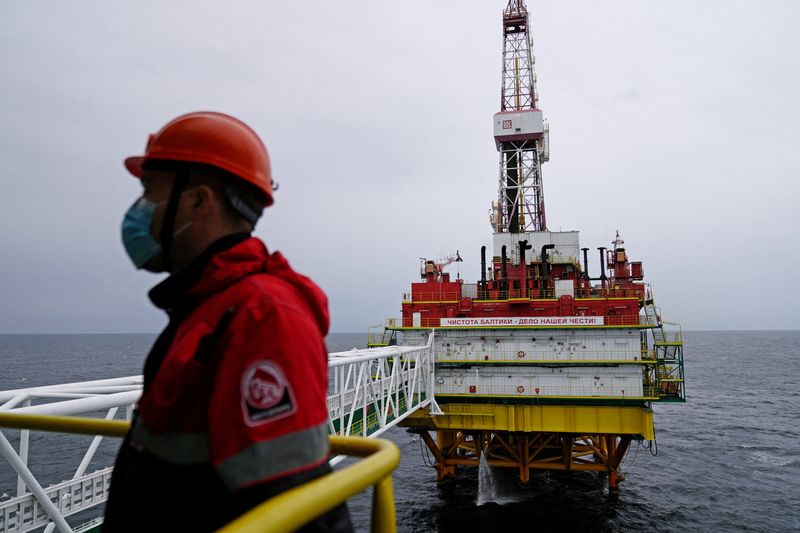By John Kemp
LONDON (Reuters) - Recession in the major economies is the only sure-fire way to reduce Russia’s petroleum revenues – an uncomfortable truth Western policymakers have tried to obfuscate from voters at home.
U.S. and EU policymakers will not deliberately plunge their economies into a recession simply to intensify the economic pressure on Russia; privation is not an attractive option in electoral politics.
But if their economies go into recession anyway, which currently appears possible or even probable, the likelihood of tough sanctions on Russia’s oil exports will increase significantly later this year and in 2023.
Russia was the world’s second-largest oil producer in 2021, with output of 536 million tonnes, behind the United States with output of 711 million tonnes, but just ahead of Saudi Arabia on 515 million tonnes.
On a mass-basis, Russia accounted for nearly 13% of worldwide production, behind the United States (17%) but marginally ahead of Saudi Arabia (12%), according to BP (NYSE:BP) (“Statistical review of world energy”, July 2022).
Saudi Arabia, the other Gulf monarchies and U.S. shale firms appear to be producing close to their current limits, with few options to raise output in the short term.
None of these producers seems both able and willing to make up for any loss of crude and refined fuel exports from Russia, in any significant volume, despite the recent surge in prices.
In the absence of a recession, the marginal barrel in the oil market is therefore from Russia, and the terms on which it is made available to international buyers in the Middle East and Asia set the global price.
So far, sanctions on Russia’s petroleum exports have driven up prices for consuming countries, while boosting Russia’s earnings because prices have risen faster than volumes have fallen.
But recession or a prolonged business cycle downturn in the major oil-consuming economies of the United States, the European Union and China would change the situation by creating spare capacity in the oil market.
The marginal price-setting barrel would no longer be exclusively from Russia; Saudi Arabia, the rest of OPEC and U.S. shale producers would all be competing to supply stagnating or shrinking consumption.
SELF-SANCTIONING
Until now, sanctions have hurt consumers more than they have punished Russia, with the European Union and the United States headed towards a business cycle downturn in large part because of high energy and other commodity prices.
The European Union, in particular, appears to have sanctioned itself close to a recession as soaring prices for oil, gas and electricity, as well as food products and manufactured items squeeze household and business spending.
This should not have come as a surprise to policymakers with a sense of history (“Energy sanctions and the impact on prices for consumers”, Kemp, June 10).
Four centuries of experience shows that energy embargoes increase prices paid by consumers significantly in the short and medium term unless there are alternative supplies readily available to make up the deficit.
Energy boycotts are an attractive policy instrument if and only if there is excess production capacity (actual or potential) that allows energy from sanctioned sources to be replaced by non-sanctioned ones.
Sanctions on Russia’s oil have boomeranged on consumers the same way they did when the English parliament banned coal shipments into London from royalist coal-producing areas in 1642/43 during the civil war.
The same problem was evident when international oil companies embargoed fuel shipments from Iran between 1951 and 1954 following nationalisation of the Anglo-Iranian Oil Company, causing fuel shortages in Asia.
RECESSION CALCULUS
Recession or a business cycle downturn would change the circumstances and make it possible, at least in principle, to replace Russia’s petroleum exports with more barrels from other suppliers.
Recession and the emergence of more spare capacity would also lead to lower prices for all producers, including Russia.
In a recession, Russia’s revenues would be hit doubly hard by the combination of lower prices and lower volumes as its barrels were replaced by barrels from other producers.
Understandably, senior U.S. and EU policymakers are not keen to engineer a deliberate recession to make sanctions more effective.
Complicated proposals for a price cap on Russia’s oil sales are an attempt to evade this dilemma, or at least hide the policy trade offs (“Russian Oil’s Achilles Heel”, Kennedy, April 7).
But if an unintended recession occurs in the next few months, it could create more space to toughen sanctions policies later in 2022 and in 2023.
Re-emergence of spare capacity would make replacement of Russian oil practical while lower prices would mask the cost of sanctions for consumers and make them more politically acceptable to voters.
With all producers hit by the simultaneous downturn in sales volumes and prices, there might be more interest in displacing Russian barrels from rivals, potentially weakening solidarity within the OPEC+ group.
Russia’s invasion of Ukraine, Western sanctions on Russia’s oil exports, and the outlook for the global economic cycle have become inextricably linked.
Related columns:
- Global business cycle starts to turn down (Reuters, June 30)
- Oil market confronts U.S. and EU policymakers with unpalatable choices (Reuters, June 29)
- EU steps back from impractical Russia oil embargo (Reuters, March 25)
- Economic war pushes business cycle to tipping point (Reuters, March 23)

- Western economies on brink of recession as Russia sanctions escalate (Reuters, March 8)
John Kemp is a Reuters market analyst. The views expressed are his own